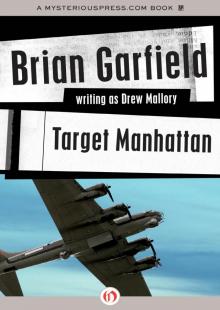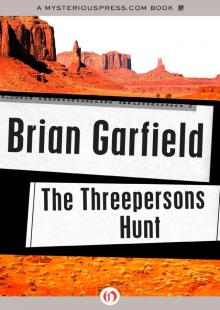- Home
- Brian Garfield
Checkpoint Charlie Page 2
Checkpoint Charlie Read online
Page 2
* * *
BY THE TIME we were belted into our seats Ross thought he had it worked out. “If we threw them a warning and then somebody got assassinated, it would look like we did it ourselves and tried to alibi it in advance. Is that what Myerson meant?”
“Go to the head of the class.” I gave him the benediction of my saintly smile. Ross is a good kid: not stupid, merely inexperienced. He has sound instincts and good moral fibre, which is more than can be said for most of the Neanderthals in the Company. I explained, “Things are touchy in Tanzania. There’s an excess of suspicion toward auslanders — they’ve been raided and occupied by Portuguese slave traders and German soldiers and British colonialists and you can’t blame them for being xenophobes. You can’t tell them things for their own good. Our only option is to neutralize the dragon lady without anyone’s knowing about it.”
He gave me a sidewise look. “Can we pin down exactly what we mean by that word ‘neutralize’?”
I said, “Have you ever killed a woman?”
“No. Nor a man, for that matter.”
“Neither have I. And I intend to keep it that way.”
“You never even carry a piece, do you, Charlie.”
“No. Any fool can shoot people.”
“Then how can we do anything about it? We can’t just ask her to go away. She’s not the type that scares.”
“Let’s just see how things size up first.” I tipped my head back against the paper antimacassar and closed my eyes and reviewed what I knew about Marie Lapautre — fact, rumor and legend garnered from various briefings and shoptalk along the corridors in Langley.
She had never been known to botch an assignment.
French father, Vietnamese mother. Born 1934 on a plantation west of Saigon. Served as a sniper in the Viet Minh forces at Dienbienphu. Ran with the Cong in the late 1960s with assignments ranging from commando infiltration to assassinations of village leaders and then South Vietnamese officials. Seconded to Peking in 1969 for specialized terrorist instruction. Detached from the Viet Cong, inducted into the Chinese Army and assigned to the Seventh Bureau — a rare honor. Seconded as training cadre to the Japanese Red Army, a terrorist gang. It was rumored Lapautre had planned the tactics for the bombings at Tel Aviv Airport in 1975. During the past seven or eight years Lapautre’s name had cropped up at least a dozen times in reports I’d seen dealing with unsolved assassinations in Laos, Syria, Turkey, Libya, West Germany, Lebanon and elsewhere.
Marie Lapautre’s weapon was the rifle. At least seven of the unsolved assassinations had been effected with long-range fire from Kashkalnikov sniper rifles — the model known to be Lapautre’s choice.
She was forty-five years old, five feet four, one hundred and five pounds, black hair and eyes, mottled burn scar on back of right hand. Spoke five languages, including English. Ate red meat barely cooked when the choice was open. She lived between jobs in a 17th century villa on the Italian Riviera — a home she had bought with funds reportedly acquired from hire-contract jobs as a freelance. Five of the seven suspected assassinations with Kashkalnikovs had been bounty jobs and the other two probably had been unpaid because she still held a commission in Peking’s Seventh Bureau.
We had met, twice and very briefly; both times on neutral ground — once in Singapore, once in Teheran. In Singapore it had been a diplomatic reception; the British attaché had introduced us and stood by watching with amusement while we sized each other up like rival gladiators but it had been nothing more than a few minutes of inconsequential pleasantries and then she had drifted off on the arm of a Malaysian black marketeer.
The files on her were slender and all we really knew was that she was a professional with a preference for the 7.62mm Kashkalnikov and a reputation for never missing a score. By implication I added one other thing: if Lapautre became aware of the fact that two Americans were moving in to prevent her from completing her present assignment she wouldn’t hesitate to kill us — and naturally she would kill us with proficient dispatch.
* * *
THE FLIGHT was interminable. I ate at least five meals. We had to change planes in Zurich and from there it was another nine hours. I noticed that Ross was having trouble keeping his eyes open by the time we checked into the New Africa Hotel.
It had been built by the Germans when Tanganyika had been one of the Kaiser’s colonies and it had been rebuilt by Africans to encourage business travel; it was comfortable enough and I’d picked it mainly for the food, but it happened to be within easy walking distance of the Kilimanjaro where Lapautre had been spotted. Also, unlike the luxurious Kilimanjaro, the New Africa had a middle-class businessman’s matter of factness and one didn’t need to waste time trying to look like a tourist.
The change in time zones seemed to bewilder Ross. He stumbled groggily when we went along to the shabby export office that housed the front organization for Arbuckle’s soporific East Africa station.
A fresh breeze came off the harbor. I’ve always liked Dar; it’s a beautiful port, ringed by palm-shaded beaches and colorful villas on the slopes. Some of the older buildings bespeak a dusty poverty but the city is more modern and energetic than anything you’d expect to find near the equator on the shore of the Indian Ocean. There are jams of hooting traffic on the main boulevards. Businessmen in various shadings: Europeans, turbaned Arabs, madrassed Asians, black Africans in tribal costumes. Now and then a four-by-four lorry growls by carrying a squad of soldiers but the place hasn’t got that air of police-state tension that makes the hairs crawl on the back of my neck in countries like Paraguay and East Germany. It occurred to me as we reached Arbuckle’s office that we hadn’t been accosted by a single beggar.
It was crowded in among cubbyhole curio shops selling African carvings and cloth. Arbuckle was a tall man, thin and bald and nervous; inescapably he was known in the Company as Fatty. He had one item to add to the information we’d arrived with: Lapautre was still in Dar.
“She’s in room four eleven at the Kilimanjaro but she takes most of her dinners in the dining room at the New Africa. They’ve got better beef.”
“I know.”
“Yeah, you would. Watch out you don’t bump into her there. She must have seen your face in dossiers.”
“We’ve met a couple of times. But I doubt she’d know Ross by sight.”
Ross was grinding knuckles into his eye sockets. “Sometimes it pays to be unimportant.”
“Hang onto that thought,” I told him. When we left the office I added, “You’d better go back to the room and take the cure for that jet lag.”
“What about you?”
“Chores and snooping. And dinner, of course. I’ll see you at breakfast. Seven o’clock.”
“You going to tell me what the program is?”
“I see no point discussing anything at all with you until you’ve had a night’s sleep.”
“Don’t you ever sleep?”
“When I’ve got nothing better to do.”
I watched him slouch away under the palms. Then I went about my business.
* * *
THE BREAKFAST layout was a nice array of fruits, juices, breads, cold cuts. I had heaped a plate full and begun to consume it when Ross came puffy-eyed down to the second-floor dining room and picked his way through the mangoes and sliced ham. He eats like a bird.
The room wasn’t crowded; a sprinkling of businessmen and a few Americans in safari costumes that appeared to have been tailored in Hollywood. I said mildly to Ross when he sat down, “I picked the table at random,” by which I meant that it probably wasn’t bugged. I tasted the coffee and made a face; you’d think they could make it better — after all they grow the stuff there. I put the cup down. “All right. We’ve got to play her cagey and careful. If anything blows loose there won’t be any cavalry to rescue us.”
“Us?”
“Did you think you were here just to feed me straight lines, Ross?”
“Well, I kind of figured I was mainly here to ho
ld your coat. On-the-job training, you know.”
“It’s a two-man job. Actually it’s a six-man job but the two of us have got to carry it.”
“Wonderful. Should I start practicing my quick draw?”
“If you’d stop asking droll questions we’d get along a little faster.”
“All right. Proceed, my general.”
“First the backgrounding. We’re jumping to a number of conclusions based on flimsy evidence but it can’t be helped.” I enumerated them on my fingers. “We assume, one, that she’s here on a job and not just to take pictures of elephants. Two, that it’s a Seventh Bureau assignment. Three, that the job is to assassinate someone — after all, that’s her principal occupation. Four, that the target may be a government leader here, but not Nyerere. We don’t know the timetable so we have to assume, five, that it could happen at any moment. Therefore we must act quickly. Are you with me so far?”
“So far, sure.”
“We assume, six, that the local Chinese station is unaware of her mission.”
“Why should we assume that?”
“Because they’re bugging her room.”
Ross gawked at me.
I am well past normal retirement age and I’m afraid it is not beneath me to gloat at the weaknesses of the younger generations. I said, “I didn’t waste the night sleeping.”
He chewed a mouthful, swallowed, squinted at me. “All right. You went through the dragon lady’s room, you found a bug. But what makes you think it’s a Chinese bug?”
“I found not one bug but three. One was ours — up-to-date equipment and I checked it out with Arbuckle. Had to get him out of bed; he wasn’t happy but he admitted it’s our bug. The second was American-made but obsolescent. Presumably placed in the room by the Tanzanian secret service — we sold a batch of that model to them about ten years ago. The third mike was made in Sinkiang Province, one of those square little numbers they must have shown you in tech briefings. Satisfied?”
“Okay. No Soviet agent worth his vodka would stoop to using a bug of Chinese manufacture, so that leaves the Chinese. So the local Peking station is bugging her room and that means either they don’t know why she’s here or they don’t trust her. Go on.”
“They’re bugging her because she’s been known to freelance. Naturally they’re nervous. But you’re mistaken about one thing. They definitely don’t know why she’s here. The Seventh Bureau never tells anyone anything. So the local station wants to find out who she’s working for and who she’s gunning for. The thing is, Ross, as far as the local Chinese are concerned she could easily be down here on a job for Warsaw or East Berlin or London or Washington or some Arab oil sheikh. They just don’t know, do they?”
“Go on.”
“Now the Tanzanians are bugging her as well and that means they know who she is. She’s under surveillance. That means we have to act circumspectly. We can’t make waves that might splash up against the presidential palace. When we leave here we leave everything exactly as we found it, all right? Now then. More assumptions. We assume, seven, that Lapautre isn’t a hipshooter. If she were she wouldn’t have lasted this long. She’s careful, she cases the situation before she steps into it. We can use that caution of hers. And finally, we assume, eight, that she’s not very well versed in surveillance technology.” Then I added, “That’s a crucial assumption, by the way.”
“Why? How can we assume that?”
“She’s never been an intelligence gatherer. Her experience is in violence. She’s a basic sort of creature — a carnivore. I don’t see her as a scientific whiz. She uses an old-fashioned sniper’s rifle because she’s comfortable with it — she’s not an experimenter. She’d know the rudiments of electronic eavesdropping but when it comes to sophisticated devices I doubt she’s got much interest. Apparently she either doesn’t know her room is bugged or knows it but doesn’t care. Either way it indicates the whole area is outside her field of interest. Likely there are types of equipment she doesn’t even know about.”
“Like for instance?”
“Parabolic reflectors. Long-range directionals.”
“Those are hardly ultrasophisticated. They date back to World War II.”
“But not in the Indochinese jungles. They wouldn’t be a part of her experience.”
“Does it matter?”
“I’m not briefing you just to listen to the sound of my dulcet baritone voice, Ross. The local Chinese station is equipped with parabolics and directionals.”
“I see.” He said it but he obviously didn’t see. Not yet. It was getting a bit tedious leading him along by the nose but I liked him and it might have been worse: Myerson might have sent along one of the idiot computer whiz-kids who are perfectly willing to believe the earth is flat if an IBM machine says it is.
I said, “You’re feeding your face and you look spry enough but are you awake? You’ve got to memorize your lines fast and play your part perfectly the first time out.”
“What are you talking about?”
* * *
ACCORDING TO PLAN ROSS made the phone call at nine in the morning from a coin box in the cable office. He held the receiver out from his ear so I could eavesdrop. A clerk answered and Ross asked to be connected to extension four eleven; it rang three times and was picked up. I remembered her voice right away: low and smoky. “Oui?”
“Two hundred thousand dollars, in gold, deposited to a Swiss account.” That was the opening line because it was unlikely she’d hang up on us right away after that teaser. “Are you interested?”
“Who is this?”
“Clearly, Mademoiselle, one does not mention names on an open telephone line. I think we might arrange a meeting, however. It’s an urgent matter.”
Ross’s palm was visibly damp against the receiver. I heard the woman’s voice: “For whom are you speaking, M’sieur?”
“I represent certain principals.” Because she wouldn’t deal directly with anyone fool enough to act as his own front man. Ross said, “You’ve been waiting to hear from me, n’est-ce-pas?” That was for the benefit of those who were bugging her phone; he went on quickly before she could deny it: “At noon today I’ll be on the beach just north of the fishing village at the head of the bay. I’ll be wearing a white shirt, short sleeves; khaki trousers and white plimsolls. I’ll be alone and of course without weapons.” I saw him swallow quickly.
The line seemed dead for a while but finally the woman spoke. “Perhaps.”
Click.
“Perhaps,” Ross repeated dismally, and cradled it.
* * *
DRIVING US NORTH in the rent-a-car he said to me, “She didn’t sound enthusiastic, did she. You think she’ll come?”
“She’ll come.”
“What makes you think so?”
“Without phone calls like that she wouldn’t be able to maintain her standard of living.”
“But if she’s in the middle of setting up a caper here —”
“It doesn’t preclude her from discussing the next job. She’ll come.”
“Armed to the teeth, no doubt,” Ross muttered.
“No. She’s a pro. A pro never carries a gun when he’s not on a job — a gun can get you into too much trouble if it’s discovered. But she’s probably capable of dismantling you by hand in a hundred different ways so try not to provoke her until we’ve sprung the trap.”
“You can be incredibly comforting sometimes, you know that?”
“You’re green, Ross, and you have a tendency to be flip and you’d better realize this isn’t a matter for frivolous heroics. You’re not without courage and it’s silly to pretend otherwise. But don’t treat this thing with childish bravado. There’s a serious risk you may end up facedown in the surf if you don’t treat the woman with all the caution in the world. Your job’s simple and straightforward and there’s nothing funny about it — just keep her interested and steer her to the right place. And for God’s sake, remember your lines.”
* *
*
WE PARKED OFF THE ROAD and walked through the palms toward the edge of the water. The beach was a narrow white strip of perfect sand curving away in a crescent. There was hardly any surf. At the far end of the curve I saw a scatter of thatched huts and a few dilapidated old piers to which were tethered a half dozen primitive outrigger fishing boats. It was pleasantly warm and the air was clear arid dry: the East African coast has none of the muggy tropicality of the West one. Two small black children ran up and down the distant sand and their strident voices carried weakly to my ears. The half mile of beach between was empty of visible life. A tourist-poster scene, I thought, but clearly a feeling of menace was preoccupying Ross; I had to steady him with a hand on his shoulder.
Out on the open water, beyond a few small boats floating at anchor, a pair of junks drifted south with the mild wind in their square sails. A dazzling white sport-fisherman with a flying bridge rode the swells in a lazy figure-eight pattern about four hundred yards offshore; two men in floppy white hats sat in the stern chairs trolling lines. Beyond, on the horizon, a tramp prowled northward — a coaster: Tanga next, then Mombasa, so forth. And there was a faint spiral of smoke even farther out — probably the Zanzibar ferry.
I put my back to the view and spoke in a voice calculated to reach no farther than Ross’s ears: “Spot them?”
Ross was searching the beach. “Not a soul. Maybe they didn’t get the hint.”
“The sport fisherman, Ross. They’ve got telescopes and long-range microphones focused on this beach right now and if I were facing them they’d hear every word I’m saying.”
That was why we’d given it several hours’ lead time after making the phone call. To give the Chinese time to get in position to monitor the meeting.
“They’ve taken the bait,” I said. “It remains to be seen whether the dragon lady will prove equally gullible.”
Ross was carrying the rifle and I crooked a finger and he gave it to me. We were still in the palms, too shadowed for the watchers on the fishing boat to get much of a look at us. I slid back into the deeper shadows and watched Ross begin to walk out along the beach, kicking sand with his toes. He had his hands in his pockets but then thought better of that and took them out again and I applauded him for that — he was making it obvious his hands were empty.

 Marshal Jeremy Six #3
Marshal Jeremy Six #3 Marshal Jeremy Six #6
Marshal Jeremy Six #6 Marshal Jeremy Six #5
Marshal Jeremy Six #5 The Outlaws 2
The Outlaws 2 Marshal Jeremy Six #7
Marshal Jeremy Six #7 The Lawbringers 4
The Lawbringers 4 Marshal Jeremy Six #4 the Proud Riders
Marshal Jeremy Six #4 the Proud Riders The Romanov succession
The Romanov succession Marshal Jeremy Six #8
Marshal Jeremy Six #8 Sliphammer
Sliphammer Line of Succession
Line of Succession Deep Cover
Deep Cover Kolchak's Gold
Kolchak's Gold Death Wish
Death Wish Suspended Sentences
Suspended Sentences The Last Bridge
The Last Bridge Relentless
Relentless The Vanquished
The Vanquished The Last Hard Men
The Last Hard Men Hit and The Marksman
Hit and The Marksman Villiers Touch
Villiers Touch Target Manhattan
Target Manhattan Marchand Woman
Marchand Woman What of Terry Conniston?
What of Terry Conniston? Threepersons Hunt
Threepersons Hunt Checkpoint Charlie
Checkpoint Charlie Romanov Succession
Romanov Succession Necessity
Necessity Death Sentence
Death Sentence Fear in a Handful of Dust
Fear in a Handful of Dust Hopscotch
Hopscotch